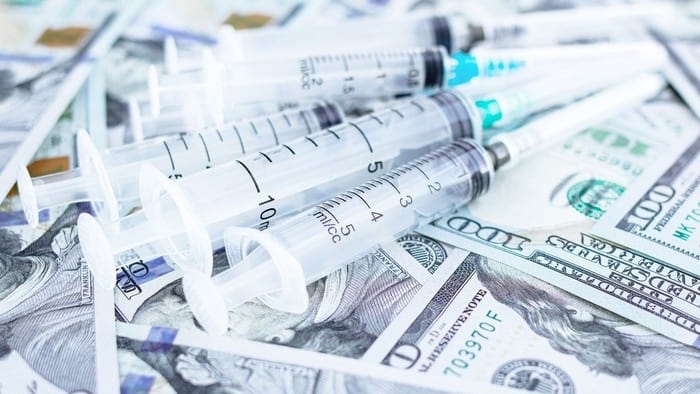This article was originally published on Fool.com. All figures quoted in US dollars unless otherwise stated.
This has been a trying year for America and the world. The coronavirus disease 2019 (COVID-19) pandemic has infected more than 69 million people worldwide (almost 16 million in the U.S.) and has led to the deaths of nearly 1.6 million people, per Johns Hopkins University of Medicine. The U.S. is closing in on 300,000 deaths from COVID-19 since the outbreak began.
But there also appears to be light at the end of the tunnel. In November, a handful of drug developers released positive late-stage interim and final analysis data from their ongoing COVID-19 vaccine trials. Pfizer (NYSE: PFE) and BioNTech (NASDAQ: BNTX) announced 95% vaccine effectiveness (VE) for BNT162b2 in a final analysis of its phase 3 study.
Meanwhile, Moderna (NASDAQ: MRNA) announced that its vaccine candidate (mRNA-1273) produced a VE of 94.1% in a late-stage primary efficacy analysis in its COVE study. With researchers expecting a VE more in line with influenza (50% to 60%), a 90%+ VE gives the U.S. and world a real chance to halt the pandemic in its tracks within the next year.
However, what's good for humanity isn't always good news for investors.
From clinical-stage company to overnight blockbuster
This year, few stocks have been hotter than Moderna, with shares of the company up 708%. Investors are clearly excited about the possibility of mRNA-1273 getting a positive review from a U.S. Food and Drug Administration (FDA) panel on Dec. 17. Having partnered with Lonza Group, Moderna anticipates producing 20 million doses in December, another 100 million to 125 million doses for the first quarter, and anywhere from 500 million to 1 billion doses in 2021.
Just days after Moderna released its interim analysis data, its CEO Stephane Bancel told a German news publication that his company intends to charge between $25 and $37 per dose of its vaccine. The price will vary based on how much of the vaccine a country buys (larger purchases will net a lower average price). Like the Pfizer/BioNTech vaccine, Moderna's mRNA-1273 is given in two doses a few weeks apart.
Assuming Moderna is able to reach the low end of its projection of 500 million doses in 2021, it would generate at least $12.5 billion in revenue from mRNA-1273. That would make it one of the world's top-selling drugs overnight.
What's more, Moderna's vaccine can be maintained for up to 30 days at standard refrigerator temperature (36 to 46 degrees Fahrenheit), and stored for up to six months at -4 F. That compares to the Pfizer/BioNTech vaccine candidate, which needs to be stored at closer to -100 F during transport. This creates distributional challenges for the latter that clearly favor Moderna.
Sounds like a slam-dunk investment, right? At a $62 billion market cap, you may want to rethink that thesis.
Moderna looks like Gilead Sciences 2.0 -- and that's not a good thing
Though Moderna looks to have a pretty clear path to being one of two early entrants in the COVID-19 vaccine space, it's unlikely to hang on the first-or-second-mover advantage for very long. We know this, because we've seen it play out before.
In 2013-2014, Gilead Sciences (NASDAQ: GILD) dazzled the world and investment community when it brought hepatitis C drugs Sovaldi and Harvoni to market. Before these therapeutics, treatments for Hep C were notoriously hit-and-miss, with patients usually experiencing a laundry list of unpleasant side effects. Gilead's treatment solutions provided a cure for more than nine in 10 patients, and the company was rewarded handsomely for it. In 2014, Gilead recorded $24.5 billion in net product sales, up from $10.8 billion in the previous year, with Harvoni and Sovaldi combining for $12.4 billion. Long story short, Gilead's first-mover advantage allowed it to scoop up the low-hanging fruit (patients with obvious Hep C symptoms).
However, Gilead was met in the years that followed by a steady increase in competition. With roughly a half-dozen competing Hep C therapies, and many of the sickest patients treated, Gilead's Hep C drug sales declined to just $2.9 billion in 2019.
Moderna is facing a similar fate. There are around two dozen COVID-19 vaccine candidates in development, and if even a half-dozen are successful within the next six to 12 months, it could potentially halve Moderna's revenue potential.
But wait -- there's more
Keep in mind that there's more to be concerned about than just two dozen other drug developers angling for their piece of the coronavirus vaccine pie.
For example, the Pifzer/BioNTech vaccine may offer more distributional challenges, but it'll be priced at $19.50 per dose. Russia's Sputnik V vaccine, which doesn't have nearly the same transparency of clinical data as you'll find in the Pfizer/BioNTech study or Moderna trial, will sell to international governments for under $10 per dose. The point is, Moderna's vaccine might be the high-water mark on price, which could potentially cost the company orders or pressure it to cut its price.
We're also missing some very critical data from these COVID-19 vaccine trials. For instance, we don't know if person-to-person transmission is possible after being given these vaccines. But more importantly, we have no clue what sort of duration of immunity these vaccines will provide. Without this knowledge, attempting to value Moderna is akin to throw darts at the dartboard while wearing a blindfold.
Moderna is also a one-pony act. Though its pipeline features over a dozen ongoing clinical-stage studies and another eight preclinical/partnered programs, Moderna's next-closest vaccine to reach FDA approval and distribution is, at the earliest, about four years away -- assuming everything goes right. This is a company that's going to be singularly reliant on mRNA-1273 for the next three to four years, at minimum.
Typically, biotech stocks are valued at a multiple that ranges between 3 and 6 times their peak annual sales potential. In 2021, with potentially 500 million doses being sold ($12.5 billion), Moderna's valuation would appear to make sense. But by 2023, total sales are likely to shrink to between $4 billion and $5 billion as new vaccines enter the market. Paying 12 to 15 times sales for 2023 is absurd for what might be a one-trick wonder.
Moderna does have plenty of cash, so it's not a threat to simply disappear overnight. But there's a very good chance that the world's most popular coronavirus stock will lose at least half of its value by 2023.
This article was originally published on Fool.com. All figures quoted in US dollars unless otherwise stated.









